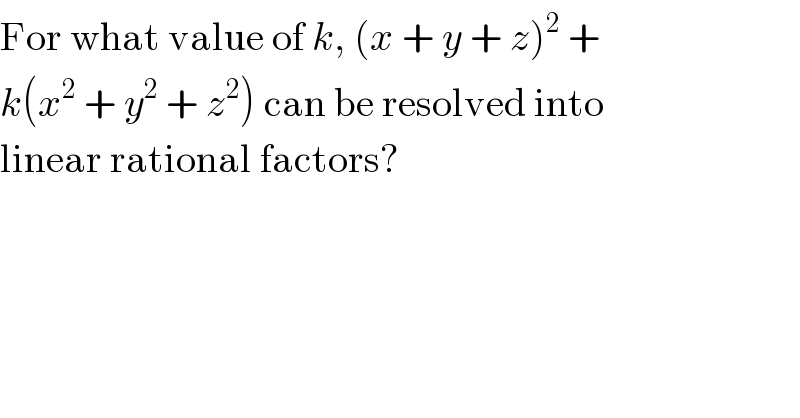
Question and Answers Forum
Question Number 20308 by Tinkutara last updated on 25/Aug/17

Answered by Tinkutara last updated on 28/Aug/17
![(x+y+z)^2 +k(x^2 +y^2 +z^2 ) =x^2 +y^2 +z^2 +2xy+2yz+2zx+k(x^2 +y^2 +z^2 ) =z^2 [((x/z))^2 +((y/z))^2 +1+((2xy)/z^2 )+((2y)/z)+((2x)/z)+k((x/z))^2 +k((y/z))^2 +k] =z^2 [X^2 +Y^2 +1+2XY+2Y+2X+kX^2 +kY^2 +k] =z^2 [(k+1)X^2 +(k+1)Y^2 +2XY+2Y+2X+(k+1)] Δ=(k+1)(k+1)(k+1)+2(1)−(k+1)−(k+1)−(k+1)=0 =(k+1)^3 −3(k+1)+2=0 ⇒k=0,−3](Q20573.png)
Commented by ajfour last updated on 28/Aug/17

| ||
Question and Answers Forum | ||
Question Number 20308 by Tinkutara last updated on 25/Aug/17 | ||
 | ||
Answered by Tinkutara last updated on 28/Aug/17 | ||
![(x+y+z)^2 +k(x^2 +y^2 +z^2 ) =x^2 +y^2 +z^2 +2xy+2yz+2zx+k(x^2 +y^2 +z^2 ) =z^2 [((x/z))^2 +((y/z))^2 +1+((2xy)/z^2 )+((2y)/z)+((2x)/z)+k((x/z))^2 +k((y/z))^2 +k] =z^2 [X^2 +Y^2 +1+2XY+2Y+2X+kX^2 +kY^2 +k] =z^2 [(k+1)X^2 +(k+1)Y^2 +2XY+2Y+2X+(k+1)] Δ=(k+1)(k+1)(k+1)+2(1)−(k+1)−(k+1)−(k+1)=0 =(k+1)^3 −3(k+1)+2=0 ⇒k=0,−3](Q20573.png) | ||
| ||
Commented by ajfour last updated on 28/Aug/17 | ||
 | ||